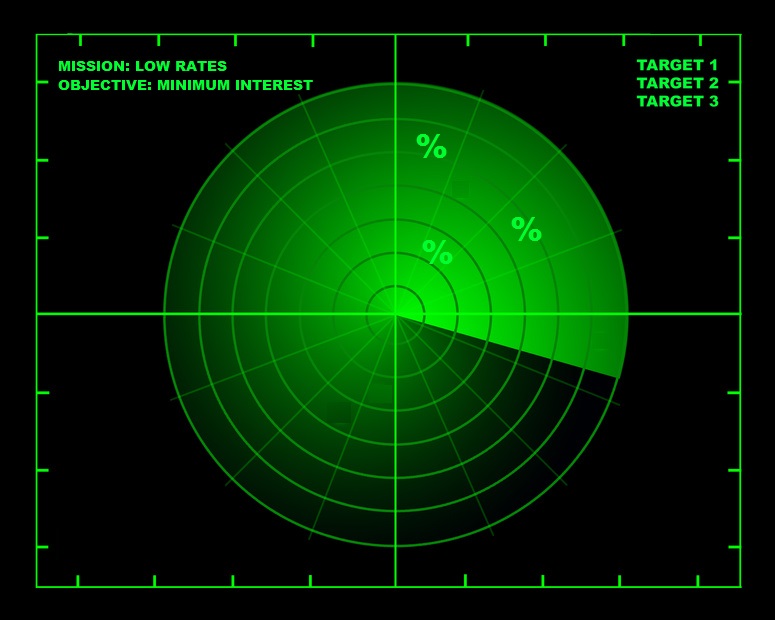 The Spy’s latest mortgage rate intel…
The Spy’s latest mortgage rate intel…
Fixed Rates
- 5-year fixed rates are up 15-20 basis points in the last 60 days (ouch).
- A basis point, or bps, is 1/100th of a percentage point.
- Fixed rates track swap rates (and bond yields, but swap rates are a better proxy if you have the data).
- 5-year swap rates shot up with U.S. Treasury yields a few weeks ago after mounting Federal Reserve rate-hike speculation.
- We’re now seeing those rates come down a notch, which has inspired a handful of competitive lenders to trim rates slightly (~5 bps).
- The average 5-year fixed rate is now up to 2.62%.
- Amazingly, some 5-year fixed rates are still sub-2.40%.
- No, you can’t get a pre-approval at this rate…the best deals are for people with set closing dates.
- In the short end of the curve, you can now find better deals on 1-year fixed rates (which are still under 2.00%) than variables.
Variable Rates
- The biggest rate surprise has been lenders slashing variable-rate discounts by up to 30 bps.
- This shift in variable pricing is a significant trend change. Up until September, variable rates had been slowly and steadily improving since mid-2012.
- Now we’ve seen banks shrink variable discounts from prime — 0.65% to prime — 0.35% in less than three months.
- Few saw this coming because the factors driving variable rates are harder to track than for fixed rates. They include:
- Rising short-term rates
- Bankers’ acceptance yields, which track many lenders’ raw variable-rate funding costs, are up 10 bps since summer.
- Competition for deposits
- Numerous lenders use deposits to fund variable rate mortgages. The battle for depositors has pushed up deposit rates by 10+ bps in recent weeks, raising the cost of mortgage capital.
- Market-wide risk premiums
- Investors are demanding higher interest rates for non-government guaranteed securities. That too is forcing lenders to pay more for mortgage funding.
- This chart shows a rough proxy of this phenomenon: https://www.quandl.com/data/
OFDP/INDEX_MARKIT_CDXNAIG- Markit-CDX-North-America- Investment-Grade-Index-IG
- MBS troubles
- Reduced liquidity (i.e., less demand) and government restrictions are challenging the mortgage-backed securities (MBS) market. That’s forcing many lenders to pay more to re-sell their mortgages to investors.
- Rising short-term rates
- It’s really a concurrence of events that’s pushing lenders to charge more for variables. What’s more, some lenders are simply moving with the herd, taking advantage of this chance to recapture profit margin while everyone else is.
Where to Next
- From past experience we know that it can take at least 3-4 times longer for variable discounts to improve than shrink.
- We may not see lenders offer great rates like prime – 0.80% again for a while.
- If the Fed hikes rates at its December 16 FOMC meeting, there could also be more pain in the fixed-rate market as swap rates follow U.S. yields higher.
- The implied odds of the Fed tightening on that date are now 77%, based on Fed Fund futures.
- At 45 bps, the spread between 5-year fixed rates and variable rates is as narrow as it has been in months.
- That could make fixed mortgages increasingly popular as many believe they’re no longer being adequately compensated for variable-rate risk.
- If the Fed does raise rates in the next 12 months, they’re calling for a small bump — think 50-100 bps in 2016.
- Other things equal, that could potentially take Canadian bond yields higher, and hence fixed mortgage rates higher, by at least one-quarter to one-half a point.
- When you see the phrase “other things equal,” remember that other things are seldom equal.
Rate Hike Fallout
- A half-point rise in mortgage rates would put a dent in housing activity, but nothing catastrophic. (Probably a 10% drop in sales over six months if you use TD Economics’ estimates.)
- On a typical $200,000 mortgage, 1/4 point extra interest costs you $2,350 over five years. That can sting families with high debt loads.
- When the Fed finally starts hiking and experts start calling for the end of low rates, we’ll see more people rush to lock in, potentially prematurely.
- In the words of Governor Stephen Poloz, Canada’s economy has “serially disappointed.” The global factors depressing growth are major long-term trends (technology, disintermediation, demographics, etc.) and inflation is comfortably contained. Don’t be surprised if the economy needs a defibrillator in a few years, and rate hikes are followed by rate cuts. People may find that short-term and variable-rate mortgages are not as risky as they seem.
As always, if you have hot rate tips, send them to “the agency” at [email protected]. We’ll never blow your cover.

 log in
log in
5 Comments
Anyone else hear the bank profit machine humming?
Hello,
I ‘m planning to move from Ottawa (Ontario) to Aylmer (Quebec). For the mortgage application I was wondering if I can have the rate for the Ontario since my current location now is Ontario?
Thank you
Moudir
Hi Moudir, Likely not. Rates are almost always based on the location of the property.
I’m not holding my breath that variable discounts will reverse course any time soon… in fact I think we may have already seen the bottom.
this is only th beginning. A lot more pain to come. All those kids who received downpayments from their parents should have fun with the monthly payments they’ll be dealing with within the next couple of years.